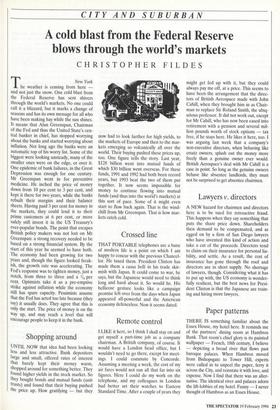CITY AND SUBURBAN
A cold blast from the Federal Reserve blows through the world's markets
CHRISTOPHER FILDES
lie weather is coming from here and not just the snow. One cold blast from the Federal Reserve has sent shivers through the world's markets. No one could call it a blizzard, but it marks a change of seasons and has its own message for all who have been making hay while the sun shines. It means that Alan Greenspan, Chairman of the Fed and thus the United State's cen- tral banker in chief, has stopped worrying about the banks and started worrying about inflation. Not long ago the banks were an automatic top of his worry list. Some of the biggest were looking unsteady, many of the smaller ones were on the edge, or over it. One epidemic of bank failures, in the Great Depression was enough for one century. Mr Greenspan went in for preventive medicine. He inched the price of money down from 10 per cent to 3 per cent, and kept it there for two years, while the banks rebuilt their margins and their balance sheets. Having paid 3 per cent for money in the markets, they could lend it to their prime customers at 6 per cent, or more safely still invest it in the US Treasury's ever-popular bonds. The point that escapes British policy makers was not lost on Mr Greenspan: a strong recovery needed to be based on a strong financial system. By the start of this year he seemed to have both. The economy had been growing for two years and, though the figure looked freak- ish, the growth rate was accelerating. The Fed's response was to tighten money, just a notch, from three to three and a 1/4 per cent. Optimists take it as a pre-emptive strike against inflation while the economy still has spare capacity. Pessimists assume that the Fed has acted too late because (they say) it usually does. They agree that this is only the start. The price of money is on the way up, and may reach a level that will encourage people to keep it in the bank.


















































 Previous page
Previous page